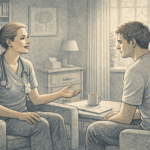Key Takeaways
- Depression and aggression often share the same roots, such as changes in brain chemistry, impulsivity, and rumination.
- Irritability and anger can be key signs of depression, especially in men, teens, and children, where sadness is less visible.
- Childhood trauma, isolation, and lack of support strongly increase the risk of both depression and aggressive behaviors.
- Setting healthy boundaries, encouraging therapy, and protecting your own well-being are vital when supporting someone struggling.
- At A Mission For Michael (AMFM), evidence-based therapies and compassionate, holistic care help clients move beyond depression-related aggression and toward lasting recovery.
The Surprising Link Between Depression and Aggressive Behavior
Depression and aggression might seem like opposite ends of the emotional spectrum. Depression typically connotes lethargy and withdrawal, while aggression suggests energy and action.
Studies have found that individuals reporting depressive symptoms are at increased risk for various forms of aggression, including general aggression, intimate partner violence, and self-directed aggression. This relationship isn’t merely coincidental—it reflects how emotional dysregulation can manifest in different but related ways.
The connection often goes unrecognized because clinicians may focus on either the aggressive behaviors or the depressive symptoms without considering how they might be interconnected. This oversight can lead to incomplete treatment approaches that fail to address the full spectrum of a person’s experience.
Founded in 2010, A Mission For Michael (AMFM) offers specialized mental health care across California, Minnesota, and Virginia. Our accredited facilities provide residential and outpatient programs, utilizing evidence-based therapies such as CBT, DBT, and EMDR.
Our dedicated team of licensed professionals ensures every client receives the best care possible, supported by accreditation from The Joint Commission. We are committed to safety and personalized treatment plans.
How Depression Triggers Aggression: The Science Behind the Connection
Depression and aggression share overlapping brain pathways and chemical imbalances. Low serotonin, which helps regulate mood, is linked to both depression and impulsive aggression. Combined with negative thought patterns like rumination, this makes emotional regulation harder and increases the risk of angry outbursts.
The Role of Irritability in Depression
Irritability is a recognized symptom of depression, especially in children and teens. Feeling constantly “on edge” can magnify small frustrations and lower the threshold for anger. Studies show that greater depression severity often corresponds with stronger aggressive tendencies, highlighting the importance of treating depression.
Gender Differences: Why Men Often Express Depression Through Anger
Men often display depression as irritability, anger, or aggression rather than sadness. Social expectations that discourage vulnerability play a role, making anger a more acceptable outlet. Because of this, many men seek help for “anger issues” rather than depression itself, which can delay proper treatment.

Aggressive behavior may reflect inner emotional struggle rather than outward hostility.
When Brain Chemistry Affects Mood Regulation
Both depression and aggression involve disrupted brain activity in areas like the prefrontal cortex (impulse control) and amygdala (emotional processing). Imbalances in serotonin, dopamine, and norepinephrine affect mood and behavior. Treatments like SSRIs can help by rebalancing these systems and improving emotional regulation.
5 Warning Signs That Aggression May Signal Depression
Aggression isn’t always just “anger issues.” In some cases, it reflects deeper struggles with depression, especially when sadness or withdrawal aren’t obvious. Recognizing these signs early can prevent escalation and open the door to more effective treatment.
1. Increased Irritability Over Small Things
When minor frustrations spark outsized reactions, snapping, slamming doors, or explosive annoyance, it may signal emotional depletion from depression. Everyday stressors feel magnified when someone lacks the energy and resilience to cope effectively.
2. Sudden Outbursts Out of Proportion
Explosive reactions that don’t match the situation often surprise both the individual and those around them. These outbursts aren’t just about the current trigger, they usually reflect bottled-up emotions that have built up under the weight of depression.
3. Self-Directed Anger and Harmful Behaviors
Not all aggression is outward. Many people turn anger inward, showing it through self-criticism, reckless behavior, or even self-injury. These actions reflect the hopelessness and self-loathing commonly linked to depression.
4. Guilt After Angry Episodes
Intense guilt or shame often follows aggressive outbursts in people with depression. This guilt-aggression cycle can reinforce negative self-perceptions, making symptoms worse unless both the anger and underlying depression are addressed in treatment.
5. Withdrawal Paired With Irritability
When someone isolates from friends or activities and shows irritability in the few interactions they have, it may point to depression. This combination often confuses loved ones, who may misinterpret it as rejection rather than emotional struggle.
Common Misconceptions About Depression and Aggression
Despite growing awareness, misconceptions about depression and aggression still block proper recognition and treatment. Understanding these myths is key to supporting people who may show depression in less obvious ways.
Depression Isn’t Just Sadness
Depression doesn’t always look like tears or exhaustion. Many experience it as irritability, anger, or cynicism, especially men, teens, and some cultural groups. When depression is narrowly viewed as “sadness,” people who don’t fit the stereotype often go undiagnosed. Recognizing anger and frustration as potential symptoms helps widen the path to treatment.
Aggression Isn’t Just Anger
Labeling someone as simply “angry” can overlook the emotional pain behind their behavior. Outbursts may reflect feelings of worthlessness, guilt, or helplessness tied to depression. By seeing aggression as a possible sign of deeper struggle, we open the door to more compassionate and effective interventions.
Substance Use Complicates the Picture
Some people turn to alcohol or other substances to cope with depression, which can lower inhibitions, heighten aggression, and deepen depressive symptoms. Because depression, aggression, and substance use often reinforce each other, lasting recovery requires addressing all three together rather than treating them in isolation.
Risk Factors That Connect Depression and Aggression
Depression and aggression often overlap because of shared vulnerabilities. Understanding these risk factors makes it easier to identify who may be most at risk and shape prevention and treatment strategies that address both conditions together.
Childhood Trauma
Abuse, neglect, or exposure to violence in early life can leave lasting imprints on the brain, especially in areas tied to emotion regulation and self-control, causing trauma. These experiences often heighten stress responses and create difficulties managing strong feelings. Without intervention, these changes may carry into adulthood, fueling both depression and aggressive tendencies. Research consistently links adverse childhood experiences (ACEs) with higher rates of both conditions.
Isolation and Lack of Support

Isolation removes emotional support, increasing the risk of anger and frustration.
Depression often pushes people to withdraw socially, which removes essential emotional buffers and healthy outlets for stress. Without supportive connections, frustration is more likely to build up and emerge as irritability or aggression. Over time, this isolation strengthens the cycle, deepening depression while reducing opportunities for positive coping.
Rumination and Negative Thinking
Many with depression struggle with rumination, repeatedly replaying negative thoughts or perceived wrongs. This cognitive habit intensifies sadness while also stoking anger, making aggressive responses more likely. Breaking this cycle with cognitive-behavioral strategies can ease both depressive symptoms and aggressive impulses.
Impulsivity
Impulsivity, the tendency to act without weighing consequences, is another link. Depression can alter brain functioning in the prefrontal cortex, reducing impulse control. When combined with irritability or frustration, this lack of regulation may increase the risk of sudden, aggressive reactions.
How to Get Help When Depression Fuels Aggression
Recognizing the link between depression and aggression is only the first step—seeking support is what leads to change. Effective treatment often combines therapy, medication when needed, and self-management strategies. Early intervention usually produces the best results, so don’t wait to reach out for help.
When to Seek Immediate Help
If you or someone you know is thinking about harming themselves or others, making plans for violence, or unable to control impulses, call 911 or go to the nearest emergency room right away.
Healthy Outlets for Emotional Release
Physical activity, like running or boxing, provides a safe way to release pent-up energy and boosts mood through endorphins. Creative outlets such as art, music, or writing can also help process emotions. Mindfulness practices, like deep breathing or meditation, teach awareness and help pause before reacting in anger.
Quick Release Techniques
Here’s a few things you can do to release built-up anger and depression:
- Short bursts of intense exercise
- Progressive muscle relaxation
- Writing uncensored thoughts in a journal
- Screaming into or punching a pillow
- Taking a cold shower
- Deep breathing with long exhales
Better Communication Skills
Expressing emotions clearly reduces the buildup that often fuels aggression. Using “I” statements keeps conversations constructive, while expanding emotional vocabulary beyond “angry” or “upset” helps identify feelings more accurately and makes it easier to ask for the right kind of support.
Supporting Someone With Aggressive Depression
Supporting a loved one with depression-related aggression takes compassion, patience, and self-protection. Their behavior often reflects inner pain rather than intent to harm, but it’s important to know that empathy doesn’t mean tolerating unsafe actions. The best support involves encouraging treatment, setting healthy boundaries, and protecting your own wellbeing.
Setting Boundaries With Care
Boundaries create safety for both you and your loved one. Be clear about what behaviors you won’t accept (e.g., yelling or throwing things) while affirming your care. Consistently following through shows that aggression is not acceptable and prevents escalation.
Encouraging Professional Help
Choose calm moments to gently suggest professional support, focusing on specific behaviors you’ve observed. If aggression escalates or includes threats of harm, seek immediate help from emergency services or a crisis hotline.
Caring for Yourself
Supporting someone in this situation can be emotionally draining. Prioritize self-care through activities that restore balance, connect with friends, or consider your own therapy or support groups. Protecting your mental health allows you to be a steadier source of support.
Moving Forward: Recovery Is Possible
With the right support, people experiencing depression-related aggression can make meaningful progress. Therapy is often the most effective path, helping individuals learn about underlying emotions, develop healthier coping skills, and improve communication. Alongside therapy, self-management practices, like exercise, mindfulness, and creative outlets, play a key role in building resilience.
Strong social support further reinforces recovery, offering encouragement and accountability along the way. While medication may be considered when symptoms remain severe or unmanageable, it’s typically viewed as a supplement to therapy rather than a first step. With patience and persistence, recovery is possible, and emotional balance can be restored.
Moving Forward: Recovery Is Possible with A Mission For Michael

Therapy at AMFM focuses on uncovering the root causes of emotional struggles for lasting change.
At A Mission For Michael (AMFM), we know that depression-related aggression can feel overwhelming, both for those experiencing it and for their loved ones. True healing takes more than surface-level fixes—it requires understanding, patience, and the right kind of support.
Our therapy-first approach helps individuals uncover the root causes of their struggles while building practical tools for managing emotions in healthier ways. We believe therapy creates lasting change, and when combined with self-management strategies, it has a clear path toward recovery.
At AMFM, we focus on:
- Evidence-based therapies such as Cognitive Behavioral Therapy (CBT) and Dialectical Behavior Therapy (DBT) help clients process emotions, reduce aggression, and strengthen resilience.
- Personalized treatment plans specific to each person’s unique history, triggers, and needs.
- Family and community support to rebuild trust, communication, and connection.
- Holistic care, including mindfulness practices, lifestyle strategies, and coping skills that can be used daily.
- Medication, only when necessary, as a supportive option when symptoms remain severe or unmanageable.
Our goal is to restore hope and balance, empowering individuals to move forward with confidence and healthier relationships.
Recovery isn’t just possible; it’s a journey we walk together. With AMFM, you don’t have to face it alone.
Frequently Asked Questions (FAQs)
What types of therapy help with depression-related aggression?
Therapies like CBT, DBT, Trauma-Informed Therapy, and Family Therapy are effective for managing depression and aggression. At A Mission For Michael (AMFM), these approaches are personalized to help clients process emotions, build coping skills, and promote lasting recovery.
How quickly can treatment reduce aggressive symptoms of depression?
Response times vary. Therapy may help within weeks, while antidepressants usually take 4–6 weeks. Lifestyle changes build benefits over months. A combined treatment plan often provides faster, more lasting improvements in aggression and mood regulation.
Is aggression in depression more common in teenagers?
Yes. Teens often express depression as irritability or aggression due to brain development, hormonal shifts, and social stress. Parents should watch for mood, school, or behavior changes that may signal depression rather than defiance.
Can seasonal depression trigger aggressive behavior?
Yes. Seasonal Affective Disorder can increase irritability or aggression, especially during winter when reduced sunlight impacts serotonin and circadian rhythms. Addressing SAD through therapy, light exposure, and lifestyle adjustments can reduce mood-related aggression.
Should I mention aggressive behaviors when seeking depression treatment?
Absolutely. Sharing aggressive thoughts or behaviors helps providers tailor treatment and ensure safety. Mental health professionals at A Mission For Michael understand these symptoms, won’t judge, and can create effective care plans. Openness leads to better outcomes and faster relief.













